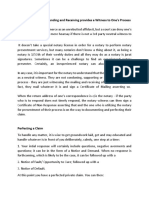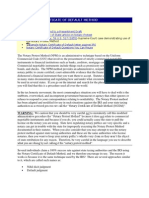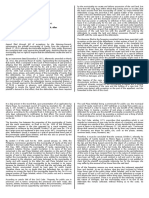100%(14)100% found this document useful (14 votes)
2K viewsPrivate Administrative Process PAP
Private Administrative Process PAP
Uploaded by
lidThis document provides an introduction to private administrative process (PAP) as an alternative to resolving disputes through the public court system. PAP operates using private law between private parties rather than public law. It outlines 10 principles of equity that guide PAP, including that one must exhaust private remedies before seeking public remedies. The document directs that all PAP communication be done through notarized affidavits and that one should not deny or dispute claims, but request proof instead. Following these private administrative procedures preserves one's rights and standing while exhausting remedies outside of public courts.
Copyright:
© All Rights Reserved
Available Formats
Download as DOC, PDF, TXT or read online from Scribd
Private Administrative Process PAP
Private Administrative Process PAP
Uploaded by
lid100%(14)100% found this document useful (14 votes)
2K views3 pagesThis document provides an introduction to private administrative process (PAP) as an alternative to resolving disputes through the public court system. PAP operates using private law between private parties rather than public law. It outlines 10 principles of equity that guide PAP, including that one must exhaust private remedies before seeking public remedies. The document directs that all PAP communication be done through notarized affidavits and that one should not deny or dispute claims, but request proof instead. Following these private administrative procedures preserves one's rights and standing while exhausting remedies outside of public courts.
Original Title
_ Private Administrative Process ^PAP
Copyright
© © All Rights Reserved
Available Formats
DOC, PDF, TXT or read online from Scribd
Share this document
Did you find this document useful?
Is this content inappropriate?
This document provides an introduction to private administrative process (PAP) as an alternative to resolving disputes through the public court system. PAP operates using private law between private parties rather than public law. It outlines 10 principles of equity that guide PAP, including that one must exhaust private remedies before seeking public remedies. The document directs that all PAP communication be done through notarized affidavits and that one should not deny or dispute claims, but request proof instead. Following these private administrative procedures preserves one's rights and standing while exhausting remedies outside of public courts.
Copyright:
© All Rights Reserved
Available Formats
Download as DOC, PDF, TXT or read online from Scribd
Download as doc, pdf, or txt
100%(14)100% found this document useful (14 votes)
2K views3 pagesPrivate Administrative Process PAP
Private Administrative Process PAP
Uploaded by
lidThis document provides an introduction to private administrative process (PAP) as an alternative to resolving disputes through the public court system. PAP operates using private law between private parties rather than public law. It outlines 10 principles of equity that guide PAP, including that one must exhaust private remedies before seeking public remedies. The document directs that all PAP communication be done through notarized affidavits and that one should not deny or dispute claims, but request proof instead. Following these private administrative procedures preserves one's rights and standing while exhausting remedies outside of public courts.
Copyright:
© All Rights Reserved
Available Formats
Download as DOC, PDF, TXT or read online from Scribd
Download as doc, pdf, or txt
You are on page 1of 3
Such a vessel is the strawman.
would regulate the intercourse of men with
men.
Inasmuch as law must always provide a
remedy, when US Inc. declared bankruptcy 4. Equity suffers no right without a remedy.
in 1933 it had to structure a means for living
people to appear in their private, proper 5. Equality is equity.
capacity and deal with whatever claims
might arise. The result is that all claims 6. Equity follows the law.
must be resolved through private
administrative process to determine 7. He who seeks equity must do equity.
whether or not the public sector (public
policy) has jurisdiction in a given matter. 8. He who seeks equity must have clean
hands.
Private Administrative Consequently, in order properly to bring or
deal with an action in the public sector, the 9. Equity will not permit a party to profit by
Process PAP private, administrative remedies must his own wrong.
properly be exhausted first. The real
Private Administrative Process
being cannot perfect his claim and assert 10. To receive equity one must give equity.
An Introduction
http://peaceportal.mobi/open/index.php? any standing as creditor in the absence of
option=com_content&view=article&id=309:pap&catid=126:h perfecting the private administrative If, in an action, both parties are in dishonor,
uman-rights-sol&directory=211
process, hereinafter “PAP,” first. both have failed to “give equity” and have
The current commercial process in the proceeded without “clean hands.” In such
world today is a Game, is created entirely in Inasmuch as all courts today are admiralty- case the judge has unbridled discretion,
the realm of FICTION, operating as private equity tribunals, the universal principles of since he is dealing with two losers from
law and private contract between legal equity are operational. inception. The judge must then do is what
fictions, i.e., Countries (Nations,) his exclusive duty is in any case, uphold
Corporations, and strawmen These principles include such maxims of public policy and collect revenue for paying
(Individuals/Sole Proprietors.) equity as: the insurance policy premiums to keep the
bankrupt corporation afloat.
Today’s operational jurisdiction is private 1. He who comes into a court of equity must
law, called “public policy,” not public law as come with clean hands. 79 Fed. Rep. 854; The solution, therefore, is never to dishonor,
existed in the Republic. To make his way in 97 Tenn. 180; 11 Tex. Civ. App. 624. i.e., always do equity and act with clean
the Real world a living being, who cannot hands, and perfect your claim in the private,
enter, operate in, or be in the realm of the 2. He who has committed iniquity shall not administrative realm at the outset of a
fictitious and imaginary, needs a have equity. Francis, 2d Max. dispute. By so doing, you have availed
commercial vessel. yourself of the remedy in law and
3. Equity denotes the spirit and habit of “exhausted your administrative remedies.”
fairness, justness, and right dealing which At this point, should the matter enter a court
Private Administrative Process PAP page 1 of 3
and be put before a judge, you will be the b. To justify or prove. Directive: Uphold public policy and collect
one with a perfected claim on the private Law a formal statement including an offer of revenue for the bankruptcy reorganization.
side and also the only party with clean proof or substantiation.
hands, having done equity and acted in Your private administrative process must
honor and good faith. “I have no idea whether your claims and operate as follows:
equity means: the state, quality, or charges are bona fide or not, or whether I
ideal of being just, impartial, and fair. have a valid obligation to satisfy the 1. Do everything by affidavit or
obligations you assert, but I am not aware asseveration, notarized.
Because administrative remedies must be of any evidence substantiating your
exhausted prior to a matter entering the position in any of these matters and if you 2. Use a notary for everything—sending out
judicial arena, as long as you are doing claim that your demands are valid, provide all of your paperwork, receiving responses,
administrative procedure, the public officials documentary proof of claim for the record keeping the notarial logbook, retaining
cannot proceed with any court action and I will comply with whatever you have copies of everything sent and received,
against the strawman. substantiated.” executing such notarial documents as those
involved in a notary protest, etc.
The administrative process consists of It is essential to remember that the entire
having your notary send (you should always current judicial system functions by 3. Have your notary send your adversaries
send and receive all paperwork by and stipulations, i.e., agreements, between your notices in the private capacity of all
through a friendly and knowledgeable disputing parties. Stipulations occur either involved parties.
notary) notice of your position to all of the by the two parties openly agreeing on a
parties, i.e., “Respondents,” who are particular point or, if they do not, the 4. Never dishonor or traverse, which you
assaulting your strawman with demands, discovery and trial process resulting in can do by enjoining (commenting on,
obligations, and charges. Said Respondents stipulations based on the ruling of the judge, whether admitting or denying) any of the
are sent your private, administrative notices i.e., the discretionary “conscience of the content, i.e., subject matter, in their
in the private capacity of all concerned, so court.” communications, as well as by ignoring
that you are operating as a real being what you receive (failing to respond
sending notices to other real beings. The The entire legal/ commercial process today within the time frames required).
nature of your paperwork is that without is a game, the essential rule of which is: Remember the definition of “traverser” from
dishonoring (denying, traversing, fault- “Whoever dishonors first loses.” Or, Black’s Law Dictionary: “In pleading, one
finding, etc.), you require that your phrased differently, “No one who dishonors who traverses or denies. A prisoner or party
adversary “put up or shut up.” In other can be assured of prevailing.” In short, if indicted; so called from his traversing the
words, you send your adversaries, in private you wish to win you must proceed without indictment.” Regard the content of their
capacity, conditional acceptances and dishonoring, or there is no guarantee you documents as their truth or fantasy, which,
negative averments that in essence state: will prevail and, what is worse, if your in either case, is not your position/ truth and
averments means: adversary is the system itself, you are therefore not your business to comment on
1. To affirm positively; declare. automatically guaranteed to lose because one way or another, other than as above,
2. Law the judge must faithfully adhere to his Prime “maybe what you say is true, but if so,
a. To assert formally as a fact. prove it.” Then you have not dishonored
Private Administrative Process PAP page 2 of 3
by ignoring, nor traversed by c. Private, commercial, and judicial denial that contradicts what one has
commenting on their statements. summary judgment and judgment in previously stated as the truth.
estoppel on the law, facts, and money.
5. Remember the maxim of law: “The After completion of the above, you can file
burden of proof resides on him who asserts, Their stipulations established by the your administrative judgment with the
not on one against whom a claim or charge foregoing process include their admission appropriate Recorder, and thereafter
is made.” They initiated the matter and are and confession, i.e., “confession of record a certified copy of the filed
demanding something from you, not the judgment,” that: judgment on a UCC-1 or UCC-3.
reverse. Therefore, in the PAP process the
burden of proof concerning the validity of 1. You are the creditor and not a debtor Remember that your notary constitutes a
their assertions rests with them, not you. concerning the transaction; third-party, disinterested witness. When the
notary, an agent of the State and the court,
6. Invoke the principle of acquiescence by 2. There is no evidence that they are the enters the public side with your private
silence, i.e., by the terms and conditions of creditor; information, your position appears on the
the interchange, their failure to put up or public record.
shut up within the time frame you allow for 3. They owe you, and you can bill them
them to prove their claims constitutes their for, the sum-certain amount set forth in the
Thereafter, any form of court action
stipulation (agreement) that your position paperwork; against your strawman would constitute
is true, correct, and complete in entirety self-validating proof, based on the public
and they are devoid of proof of claim for 4. They have failed to state a claim upon record that has been established, that any
anything they’ve alleged against the which relief can be granted; and all involved parties — are acting
strawman. inequitably and with unclean hands. If
5. Any and all proceeding against you you have any form of court proceeding
7. After you have consummated your thereafter constitutes a libel on the public asserted against you show the judge that he
private administrative process, proceed to record authorizing your filing a libel of has only one course of action based on the
the public side by invoking the notary for review in the (general) admiralty against all record.
the notarial protest process, at the end of parties in their private capacity, devoid of
which you have the following established as official immunity; Once the PAP process has been
documentary proof on the record: completed, then all manner of remedies and
6. They and all others are hereafter forever recourses exist for you that formerly did not
a. A private (from you) and public (from the estopped (means from raising the issue, and could not. These include a habeas
notary) exhaustion of administrative contesting the stipulations, or proceeding corpus, criminal affidavits, maritime
remedies; against you in any way concerning what has liens, and other remedies.
been finalized.
b. A complete set of stipulations by them habeas corpus means: a writ ordering a
in support of your position; Estoppel means: A bar preventing person to be brought before a court or judge, esp.
one from making an allegation or a so that the court may ascertain whether his
detention is lawful ( and or should be released.)
Latin writ, literally: You may have the body.
Private Administrative Process PAP page 3 of 3
You might also like
- The ZERO Percent: Secrets of the United States, the Power of Trust, Nationality, Banking and ZERO TAXES!From EverandThe ZERO Percent: Secrets of the United States, the Power of Trust, Nationality, Banking and ZERO TAXES!Rating: 4.5 out of 5 stars4.5/5 (21)
- Notarial Protest ManualDocument183 pagesNotarial Protest Manualapi-383325398% (80)
- Private Administrative ProcessDocument12 pagesPrivate Administrative ProcessTitle IV-D Man with a plan96% (155)
- How To Become A Secured Party Creditor in 19 MinutesDocument6 pagesHow To Become A Secured Party Creditor in 19 MinutesMahid Samad91% (141)
- 3 Step Administrative ProcedureDocument17 pages3 Step Administrative ProcedureAnthony Kent99% (101)
- Private Administrative ProcessDocument3 pagesPrivate Administrative ProcessTrueVa1ue100% (46)
- A Private Administrative ProcessDocument2 pagesA Private Administrative Processfreedompool113915100% (35)
- Notary Presentment InstructionsDocument3 pagesNotary Presentment InstructionsTitle IV-D Man with a plan95% (19)
- Notary Presentment PDFDocument2 pagesNotary Presentment PDFSuzanne Cristantiello92% (12)
- Course 8 Private Banking 47Document47 pagesCourse 8 Private Banking 47halcino100% (14)
- Notary Certificate of DishonorDocument4 pagesNotary Certificate of DishonorDennis-Jospeh88% (16)
- Motions, Affidavits, Answers, and Commercial Liens - The Book of Effective Sample DocumentsFrom EverandMotions, Affidavits, Answers, and Commercial Liens - The Book of Effective Sample DocumentsRating: 4.5 out of 5 stars4.5/5 (17)
- The Book of Writs - With Sample Writs of Quo Warranto, Habeas Corpus, Mandamus, Certiorari, and ProhibitionFrom EverandThe Book of Writs - With Sample Writs of Quo Warranto, Habeas Corpus, Mandamus, Certiorari, and ProhibitionRating: 5 out of 5 stars5/5 (10)
- Creditors and Their Bond ExtendedDocument525 pagesCreditors and Their Bond ExtendedRita91% (44)
- How To Do A Proper Refusal For CauseDocument5 pagesHow To Do A Proper Refusal For CauseZIONCREDITGROUP82% (17)
- The Honor-Dishonor ProcessDocument126 pagesThe Honor-Dishonor ProcessJason Henry100% (9)
- The Art of Recusing a Judge - With Ultimate Loopholes and a Sample Motion to RecuseFrom EverandThe Art of Recusing a Judge - With Ultimate Loopholes and a Sample Motion to RecuseRating: 4.5 out of 5 stars4.5/5 (7)
- Living in The PrivateDocument31 pagesLiving in The Privatepanamahunt2293% (44)
- 1-3-Notice of Default in DishonorDocument2 pages1-3-Notice of Default in DishonorJason Henry100% (10)
- Fight Debt Collectors and Win: Win the Fight With Debt CollectorsFrom EverandFight Debt Collectors and Win: Win the Fight With Debt CollectorsRating: 5 out of 5 stars5/5 (12)
- The Artificial Person and the Color of Law: How to Take Back the "Consent"! Social Geometry of LifeFrom EverandThe Artificial Person and the Color of Law: How to Take Back the "Consent"! Social Geometry of LifeRating: 4.5 out of 5 stars4.5/5 (13)
- Sample Motion to Vacate, Motion to Dismiss, Affidavits, Notice of Objection, and Notice of Intent to File ClaimFrom EverandSample Motion to Vacate, Motion to Dismiss, Affidavits, Notice of Objection, and Notice of Intent to File ClaimRating: 5 out of 5 stars5/5 (23)
- Notarial Protest ManualDocument183 pagesNotarial Protest ManualMalcolm Walker100% (1)
- Notice of Acceptance Presentmants 1 0f 4Document2 pagesNotice of Acceptance Presentmants 1 0f 4TynishaDavis80% (5)
- Commercial Lien ProcessDocument4 pagesCommercial Lien Processglallen01100% (17)
- The Notary Certificate of Default MethodDocument12 pagesThe Notary Certificate of Default Methodkleua9053100% (22)
- Detailed Living in The Private Program DiagramDocument1 pageDetailed Living in The Private Program Diagramknownperson86% (7)
- Private Administrative ProcessDocument7 pagesPrivate Administrative ProcessAlex Moore-Minott100% (11)
- Administrative Process of Using Notices To Offer Discussion To Avoid Conflict and Secure A Declaratory JudgementDocument4 pagesAdministrative Process of Using Notices To Offer Discussion To Avoid Conflict and Secure A Declaratory JudgementSean Peete100% (12)
- Administrative Process Is Essentially The Record of A Court ProcessDocument4 pagesAdministrative Process Is Essentially The Record of A Court Processdbush2778100% (2)
- HonorDishonorProcess - Victoria Joy-1 PDFDocument126 pagesHonorDishonorProcess - Victoria Joy-1 PDFarjay1266100% (5)
- Administrative LawDocument45 pagesAdministrative LawMaryUmbrello-Dressler93% (15)
- JOHN HENRY DOE Conditional Acceptance For Mandatory VaccineDocument11 pagesJOHN HENRY DOE Conditional Acceptance For Mandatory VaccineAnonymous100% (4)
- Administrative ProcessDocument17 pagesAdministrative Processshennakim100% (3)
- Monetizing Judgments DatasheetDocument9 pagesMonetizing Judgments DatasheetJohnWilliams100% (4)
- 1-Notice of Acceptance To ContractDocument3 pages1-Notice of Acceptance To Contractlanebarnes100% (2)
- Accepted For Value Does It Really WorkDocument13 pagesAccepted For Value Does It Really WorkDamonta Henry50% (2)
- How to Get Rid of Your Unwanted Debt: A Litigation Attorney Representing Homeowners, Credit Card Holders & OthersFrom EverandHow to Get Rid of Your Unwanted Debt: A Litigation Attorney Representing Homeowners, Credit Card Holders & OthersRating: 3 out of 5 stars3/5 (1)
- David W Moore Opinion MakersDocument217 pagesDavid W Moore Opinion MakersISSACG74No ratings yet
- Tanada vs. Angara (Digest)Document7 pagesTanada vs. Angara (Digest)AJ Aslarona100% (6)
- Court The 3 Pillar: by Faculty, Bscrim, Mscrim, Phdcrim Angeles University FoundationDocument48 pagesCourt The 3 Pillar: by Faculty, Bscrim, Mscrim, Phdcrim Angeles University FoundationRhem Rick Corpuz100% (4)
- How to Break (or renegotiate) ANY ContractFrom EverandHow to Break (or renegotiate) ANY ContractRating: 5 out of 5 stars5/5 (2)
- Quick Administrative Process Plus Court Enforcement ProcessDocument53 pagesQuick Administrative Process Plus Court Enforcement ProcessBrad100% (2)
- The Notary Certificate of Default MethodDocument12 pagesThe Notary Certificate of Default MethodPETE100% (5)
- Steps To Protest OverviewDocument12 pagesSteps To Protest Overviewcjjustice1100% (4)
- A Sample Mailing Process - The Runaway ContractDocument9 pagesA Sample Mailing Process - The Runaway ContractTrüeInfinity100% (1)
- 5 Ways To Handle A PresentmentDocument9 pages5 Ways To Handle A Presentmenttoski_tech5051100% (4)
- Administrative Procedure OutlineDocument1 pageAdministrative Procedure OutlineGreg Wilder100% (2)
- 5 Power of AcceptanceDocument62 pages5 Power of AcceptanceEmpressInI100% (15)
- Being in HonorDocument2 pagesBeing in Honorfreedompool113915100% (7)
- The Commercial Lien ProcessDocument4 pagesThe Commercial Lien Processkayvan1680% (5)
- Washington State Warrant Processing Division Scrubs Website That (Court) Warrants Are Merely ChecksDocument14 pagesWashington State Warrant Processing Division Scrubs Website That (Court) Warrants Are Merely Checkspanamahunt2267% (3)
- JACK'S HANDY GUIDE TO TRUSTS: Staying Out of CourtFrom EverandJACK'S HANDY GUIDE TO TRUSTS: Staying Out of CourtRating: 5 out of 5 stars5/5 (1)
- Introduction to Negotiable Instruments: As per Indian LawsFrom EverandIntroduction to Negotiable Instruments: As per Indian LawsRating: 5 out of 5 stars5/5 (1)
- Free & Clear, Standing & Quiet Title: 11 Possible Ways to Get Rid of Your MortgageFrom EverandFree & Clear, Standing & Quiet Title: 11 Possible Ways to Get Rid of Your MortgageRating: 2 out of 5 stars2/5 (3)
- The Ultimate Weapon in Debt Elimination: Unlocking the Secrets in Debt EliminationFrom EverandThe Ultimate Weapon in Debt Elimination: Unlocking the Secrets in Debt EliminationRating: 5 out of 5 stars5/5 (1)
- The Honourable Sri Justice Goda RaghuramDocument9 pagesThe Honourable Sri Justice Goda RaghuramDasharath TallapallyNo ratings yet
- The Pittston Dispatch 05-26-2013Document62 pagesThe Pittston Dispatch 05-26-2013The Times LeaderNo ratings yet
- H.2 City of Baguio Vs de Leon GR No. L-24756 10311968 PDFDocument3 pagesH.2 City of Baguio Vs de Leon GR No. L-24756 10311968 PDFbabyclaire17No ratings yet
- History of Administration in BDDocument45 pagesHistory of Administration in BDforhad008No ratings yet
- Anonymous Letter-Complaint Against Atty. Miguel Morales, Clerk of Court, MeTC ManilaDocument2 pagesAnonymous Letter-Complaint Against Atty. Miguel Morales, Clerk of Court, MeTC ManilaJenine QuiambaoNo ratings yet
- Suits 1x04 Dirty Little Secrets.720p HDTV - dimeNSION.enDocument80 pagesSuits 1x04 Dirty Little Secrets.720p HDTV - dimeNSION.enkitoko21No ratings yet
- Memphis Light, Gas & Water Div. v. Craft, 436 U.S. 1 (1978)Document26 pagesMemphis Light, Gas & Water Div. v. Craft, 436 U.S. 1 (1978)Scribd Government DocsNo ratings yet
- CASES - Property #2Document82 pagesCASES - Property #2Sam ReyesNo ratings yet
- Declaration of Ruth Stoner Muzzin 2-08-17Document75 pagesDeclaration of Ruth Stoner Muzzin 2-08-17L. A. PatersonNo ratings yet
- Hoechst Pharmaceuticals V State of Bihar Air 1983 SC 1019 PDFDocument21 pagesHoechst Pharmaceuticals V State of Bihar Air 1983 SC 1019 PDFRocking Me0% (1)
- EH 408 August 30 RecitsDocument5 pagesEH 408 August 30 RecitsVenice Jamaila DagcutanNo ratings yet
- BAsic Structure Project For Second ConsultATION SD SD Consti NewDocument21 pagesBAsic Structure Project For Second ConsultATION SD SD Consti NewSatvik DhingraNo ratings yet
- Your Name: District The Northern OF DivisionDocument6 pagesYour Name: District The Northern OF Divisionwarriorseven100% (1)
- Senate Hearing, 112TH Congress - Confirmation Hearings On Federal AppointmentsDocument972 pagesSenate Hearing, 112TH Congress - Confirmation Hearings On Federal AppointmentsScribd Government DocsNo ratings yet
- Archie Tan FulltextDocument11 pagesArchie Tan FulltextjamescullaNo ratings yet
- ADR Report Construction ArbitrationDocument10 pagesADR Report Construction ArbitrationFrederick BarcelonNo ratings yet
- Presidential Decree No. 1602 Prescribing Stiffer Penalties On Illegal GamblingDocument49 pagesPresidential Decree No. 1602 Prescribing Stiffer Penalties On Illegal GamblingJasmine Montero-GaribayNo ratings yet
- DemocracyvauthoritarianDocument9 pagesDemocracyvauthoritarianapi-301535260No ratings yet
- Lesson 16Document2 pagesLesson 16tigo143No ratings yet
- Reply Position Paper - MAGANADocument12 pagesReply Position Paper - MAGANANARAG LAW OFFICENo ratings yet
- R O N P I J D S ": Symbiosis Law School, PuneDocument13 pagesR O N P I J D S ": Symbiosis Law School, Punenupur jhodNo ratings yet
- Former Cornelius Police Officers Civil LawsuitDocument14 pagesFormer Cornelius Police Officers Civil LawsuitKyle IboshiNo ratings yet
- Supreme Court Order On Quantum of Sentence in Nitish Katara Murder Case PDFDocument93 pagesSupreme Court Order On Quantum of Sentence in Nitish Katara Murder Case PDFLatest Laws TeamNo ratings yet
- Ps 361 Course Outline 2012 - 2013 Semester 1Document2 pagesPs 361 Course Outline 2012 - 2013 Semester 1Respicius Damian ShumbushoNo ratings yet
- Amado Corpus JR V Judge PamularDocument2 pagesAmado Corpus JR V Judge PamularJeffrey Fuentes100% (1)
- Admission and Enrollement of Advocates Right Ot PracticeDocument12 pagesAdmission and Enrollement of Advocates Right Ot Practiceabhinavsharmaa1122No ratings yet
- Sample Pre Trial Brief and ReplyDocument6 pagesSample Pre Trial Brief and ReplyKnotsNautischeMeilenproStundeNo ratings yet

























































































